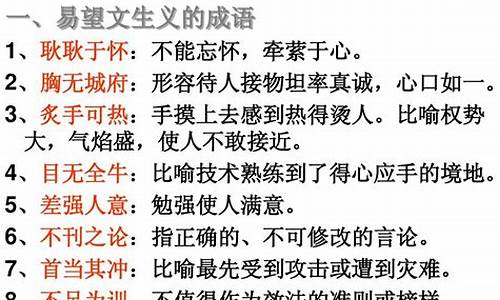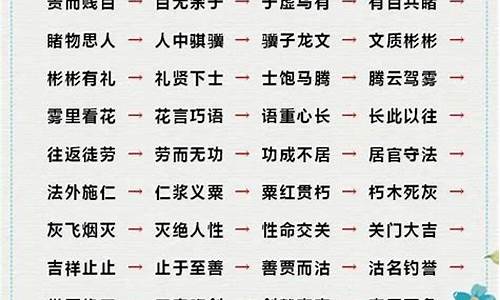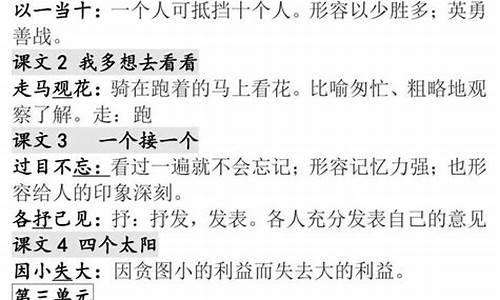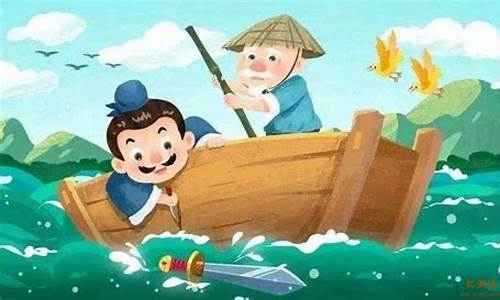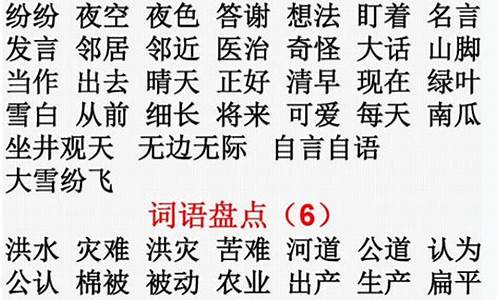您现在的位置是: 首页 > 成语出处大全 成语出处大全
一本中国成语故事用英语怎么说_一本中国成语故事的英文怎么说
ysladmin 2024-06-26 人已围观
简介一本中国成语故事用英语怎么说_一本中国成语故事的英文怎么说 非常感谢大家对一本中国成语故事用英语怎么说问题集合的关注和提问。我会以全面和系统的方式回答每个问题,并为大家提供一些实用的建议和思路。1.英语写成语故事2
非常感谢大家对一本中国成语故事用英语怎么说问题集合的关注和提问。我会以全面和系统的方式回答每个问题,并为大家提供一些实用的建议和思路。
1.英语写成语故事
2.守株待兔成语故事英文版?
3.经典英语成语故事及翻译(五篇)
4.英语成语故事中英对照
5.英语成语故事及翻译三篇
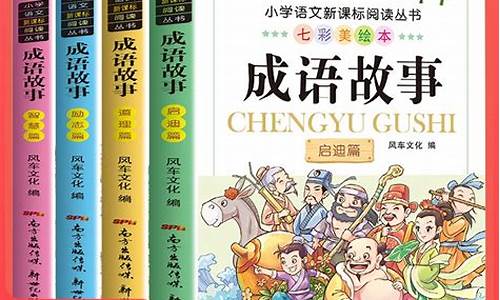
英语写成语故事
一言九鼎战国时,秦国的军队团团包围了赵国的都城邯郸,形势十分危急,赵国国君孝成王派平原君到楚国去求援。平原打算带领20名门客前去完成这项使命,已挑了十九名,尚少一个定不下来。这时,毛遂自告奋勇提出要去,平原君半信半疑,勉强带着他一起前往楚国。
平原君到了楚国后,立即与楚王谈及“援赵”之事,谈了半天也毫无结果。这时,毛遂对楚王说:“我们今天来请你派援兵,你一言不发,可你别忘了,楚国虽然兵多地大,却连连吃败仗,连国都也丢掉了,依我看,楚国比赵国更需要联合起来抗秦呀!”毛遂的一席话说得楚王口服心服,立即答应出兵援赵。
平原君回到赵国后感慨地说:“毛先生一至楚,而使楚重于九鼎大吕The warring states, qin army surround the zhao4 guo2's nagara handan, the situation was very urgent, zhao monarch king appointed plain gentleman filial piety to go begging. To chu Plain going to lead 20 to finish the mission, and, MenKe already picked the nineteenth, still less a name shall not come down. At this time, MAO hence proposed to go, plain herassessment salt, reluctantly prince took him went to chu. Plain gentleman to chu immediately after the king talked with the assistance zhao ", talked about the along while also no results. At this time, for the king hair wait, said: "we come here today you send reinforcements, you say, you don't forget, chu although soldiers much bigger, but repeatedly defeats, even countries and lost, in my opinion, chu need more than zhao4 guo2's combined resistance to qin!" Hair wait goes speak oral needs, immediately promised king mullen aassistance zhao. Plain gentleman zhao4 guo2's back after regrets ground say: "hair sir, which enables one to chu chu heavier than the nine tripods big lu."
守株待兔成语故事英文版?
画龙点睛。字面的意思是画龙之后再点上眼睛。这个成语多用于说话写作那么关于它的历史典故是怎样的呢?一起来看看吧:
Mr. Li is a good painter. One day he draws a beautiful dragon without eyes.
Mr. Zhou looks at the picture and says, “The dragon has no eyes. It isn’t a good picture.”
But Mr. Li smiles and says, “If I add eyes to the dragon, it will fly away.”
Mr. Zhou shakes head and says, “You are boasting. I don’t believe you.”
Mr. Li isn’t angry. He holds the paintbrush and adds eyes to the dragon. Woe! The dragon really flies.
李先生是位很好的画家。一天画了一条栩栩如生的龙,但是这只龙没有眼睛。
周先生见了说:“这条龙没有眼睛。这不算一张好画。”
可是李先生笑着说:“如果我给它加上眼睛,它就会飞走了。”
周先生摇头说:“你吹牛。我不相信。”
李先生也不生气,只是拿起笔给龙点上眼睛。哇!龙真的飞走了。
经典英语成语故事及翻译(五篇)
⑴ 守株待兔的成语故事守株待兔成语故事:
相传在战国时代宋国,有一个农民,日出而作,日入而息.遇到好年景,也不过刚刚吃饱穿暖;一遇灾荒,可就要忍饥挨饿了.他想改善生活,但他太懒,胆子又特小,干什么都是又懒又怕,总想碰到送上门来的意外之财。
奇迹终于发生了。深秋的一天,他正在田里耕地,周围有人在打猎。吆喝之声四处起伏,受惊的小野兽没命的奔跑。突然,有一只兔子,不偏不倚,一头撞死在他田边的树根上。当天,他美美地饱餐了一顿。
从此,他便不再种地。一天到晚,守着那神奇的树根,等着奇迹的出现。
成语“守株待兔”,比喻亡想不劳而得,或死守狭隘的经验,不知变通。
(1)守株待兔成语故事英文版扩展阅读
守株待兔
成语拼音:shǒu zhū dài tù
成语解释:比喻死守狭隘经验;不知变通;或抱着侥幸心理妄想不劳而获。
成语出处:战国 韩韩非《韩非子五蠹》:“宋人有耕田者,田中有株,兔也,触柱折颈而死。”
成语用法:守株待兔连动式;作宾语、定语;含贬义。
成语正音:待,不能读作“dǎi”。
成语辨形:待,不能写作“侍”。
成语辨析:守株待兔和“刻舟求剑”;都含有“不知变通”之意。但守株待兔重在“守”和“待”;形容人不作主观努力;只是存在侥幸心理;想获得意外成功;而“刻舟求剑”偏重于“刻”和“求”;强调虽然主观上努力;但不了解情况变化;不知变通而采取错误方法。
近义词:刻舟求剑、墨守成规
反义词:通达权变
成语例子:吾料兄必定出身报国,岂是守株待兔之辈。(明许仲琳《封神演义》第九十四回)
⑵ 成语故事《守株待兔》动画
成语: 守株待兔
拼音: shǒu zhū dài tù
解释: 株:露出地面的树根。原比喻希图不经过努力而得到成功的侥幸心理。现也比喻死守狭隘经验,不知变通。
出处: 《韩非子·五蠹》记载:战国时宋国有一个农民,看见一只兔子撞在树根上死了,便放下锄头在树根旁等待,希望再得到撞死的兔子。
举例造句: 吾料兄必定出身报国,岂是守株待兔之辈! 明·许仲琳《封神演义》第九十四
拼音代码: szdt
近义词:刻舟求剑、墨守成规
反义词: 通达权变
灯谜: 柳
用法: 作宾语、定语;指不知变通
英文: stand by a stump waiting for more hares to e and clash themselves against it--trust to chance and windfalls
故事: 从前宋国有一个农夫在地里干活,忽然从远处跑来一只兔子,它十分慌张,一不小心就撞在树桩上死了。农夫很高兴,捡起这只死兔子回家美美地饱餐一顿。他想每天都有这样的好事就好了,于是他放下农具整天守在那颗树下,一无所获
动画网址网页链接
⑶ 英语版中国成语故事
江郎才尽
Southern Dynasties of Jiang Yan, word Wen-tung, when he was young, became a Dingdingyouming writer, his poems and articles at the time received high acclaims. However, when he is getting older, he has not previously written an article good, but a lot of setbacks. His poems written in prosaic; and pick up a pen-yin grip for a long time, still can not write a word, the occasional inspiration came; poem written, but the textual Kuse, content, plain were pletely useless. So some people to legend, once a boat parked in Chan Jiang Yan-Ling Monastery river and dream of a self-named Zhang Jingyang person; to his followers repay a silk, he would arrest a few feet from her, he is also silk. Thus, his article there will be no wonderful. It was also legend; once the rule of Jiang Yan in the booth sleeping too; dreamed that a person claiming to Guo Pu, walked over to his side, his claim to the pen, said to him: "Man Michie, I have a pen in your place has been a long time, and now should be able to give it to me the bar! "Jiang Yan heard, they dig out from his arms, he is also a five-color pen. Reportedly Since then, Jiang Yan on Evans exhausted and could not write the article in any good.
Jiang Yan's talent has not really run out, but he was an officer after the one hand, as the Chief busy, on the other hand also because of career proud of, without their own write, to sweat, they did not write the. Over time, the article will bring out less, lacking in talent. (Excerpt from "Practical Writing" 1995 No. 8 "I hope," Jiang "was not exactly")
南朝的江淹,字文通,他年轻的时候,就成为一个鼎鼎有名的文学家,他的诗和文章在当时获得极高的评价。 可是,当他年纪渐渐大了以后,他的文章不但没有以前写得好了,而且退步不少。他的诗写出来平淡无奇;而且提笔吟握好久,依旧写不出一个字来,偶尔灵感来了;诗写出来了,但文句枯涩,内容 平淡得一无可取。于是就有人传说,有一次江淹乘船停在禅灵寺的河边,梦见一 个自称叫张景阳的人;向他讨还一匹绸缎,他就从怀中拘出几尺绸缎还他。因此,他的文章以后便不精彩了。又有人传说;有一次江淹在冶亭中睡午觉;梦见一个自称郭璞 的人,走到他的身边,向他索笔,对他说:“文通兄,我有一支笔在你那儿已经很久了,现在应该可以还给我了吧!” 江淹听了,就顺手从怀里取出一支五色笔来还他。据说从此以后,江淹就文思枯竭,再也写不出什么好的文章了。
其实并不是江淹的才华已经用完了,而是他当官以后,一方面由于政务繁忙,另一方面也由于仕途得意,无需自己动笔,劳心费力,就不再动笔了。久而久之,文章自然会逐渐逊色,缺乏才气。(节选自《应用写作》1995年第8期《但愿“江郎”才不尽》)
⑷ 守株待兔成语故事350字
守株待兔
宋国有个农夫种着几亩地,他的地头上有一棵大树,
守株待兔的成语故事
。一天,他在地里干活,忽然看见一只兔子箭一般地飞奔过来,猛的撞在那棵大树上,一下子把脖子折断了,蹬蹬腿就死了。这个农夫飞快的跑过去,把兔子捡起来,高兴地说:“这真是一点劲没费,白捡了个大便宜,回去可以美美地吃上一顿了。”他拎着兔子一边往家走,一边得意地想:“我的运气真好, 没准明天还会有兔子跑来,我可不能放过这样的便宜。” 第二天,他到地里,也不干活,只守着那棵大树,等着兔子撞过来。结果,等了一天什么也没等到。他却不甘心,从此,天天坐在那棵大树下等着兔子来撞死。他等呀等呀,直等到地里的野草长得比庄稼都高了,连个兔子影也没有再见到。
⑸ 守株待兔的成语故事(50——100字左右)
从前宋国有一个农夫在地里干活,忽然从远处跑来一只兔子,它十分慌张,一不小心就撞在树桩上死了。农夫很高兴,捡起这只死兔子回家美美地饱餐一顿。他想每天都有这样的好事就好了,于是他放下农具整天守在那颗树下,一无所获。
(5)守株待兔成语故事英文版扩展阅读
守株待兔
成语拼音:shǒu zhū dài tù
成语解释:比喻死守狭隘经验;不知变通;或抱着侥幸心理妄想不劳而获。
成语出处:战国 韩韩非《韩非子五蠹》:“宋人有耕田者,田中有株,兔也,触柱折颈而死。”
成语用法:守株待兔连动式;作宾语、定语;含贬义。
成语正音:待,不能读作“dǎi”。
成语辨形:待,不能写作“侍”。
成语辨析:守株待兔和“刻舟求剑”;都含有“不知变通”之意。但守株待兔重在“守”和“待”;形容人不作主观努力;只是存在侥幸心理;想获得意外成功;而“刻舟求剑”偏重于“刻”和“求”;强调虽然主观上努力;但不了解情况变化;不知变通而采取错误方法。
近义词:刻舟求剑、墨守成规
反义词:通达权变
成语例子:吾料兄必定出身报国,岂是守株待兔之辈。(明许仲琳《封神演义》第九十四回)
⑹ 现代版成语故事《守株待兔》
守株待兔
shǒu zhū dài tù
解释株:露出地面的树根。原比喻希图不经过努力而版得到成功的侥幸心权理。现也比喻死守狭隘经验,不知变通。
出处《韩非子·五蠹》记载:战国时宋国有一个农民,看见一只兔子撞在树根上死了,便放下锄头在树根旁等待,希望再得到撞死的兔子。
结构连动式。
用法用作贬义。一般作宾语、定语。
正音待;不能读作“dǎi”。
辨形待;不能写作“侍”。
近义词刻舟求剑、墨守成规
反义词通达权变
辨析~和“刻舟求剑”;都含有“不知变通”之意。但~重在“守”和“待”;形容人不作主观努力;只是存在侥幸心理;想获得意外成功;而“刻舟求剑”偏重于“刻”和“求”;强调虽然主观上努力;但不了解情况变化;不知变通而采取错误方法。
例句美好的生活要靠自己去创造;这样如同~;能有好日子过吗?
英译waitfainswithoutpains
⑺ 中英文版成语故事书。
广州市北京路科技图书馆有得卖!成语典故
⑻ 守株待兔 成语故事 贝瓦
守株待兔 shǒu zhū dài tù
解释: 株:露出地面的树根。原比喻希图不经过努力而得到成功的侥幸心理。现也比喻死守狭隘经验,不知变通。
成语故事:
春秋时代有位宋国的农夫,他每天早上很早就到田里工作,一直到太阳下山才收拾农具准备回家。有一天,农夫正在田里辛苦的工作,突然却远远跑来一只兔子。这只兔子跑得又急又快,一个不小心,兔子撞上稻田旁边的大树,这一撞,撞断了兔子的颈部,兔子当场倒地死亡。一旁的农夫看到之后,急忙跑上前将死了的兔子一手抓起,然后很开心的收拾农具准备回家把这只兔子煮来吃。农夫心想,天底下既然有这么好的事,自己又何必每天辛苦的耕田?
从此以后,他整天守在大树旁,希望能再等到不小心撞死的兔子。可是许多天过去了,他都没等到撞死在大树下的兔子,反而因为他不处理农田的事,因此田里长满了杂草,一天比一天更荒芜。
⑼ 小学一年级英汉双译成语故事:守株待兔
成语故事:宋国有个农夫正在田里翻土。突然,他看见有一只野兔从旁边的草丛里慌慌张张地窜出来,一头撞在田边的树墩子上,便倒在那儿一动也不动了。农民走过去一看:兔子死了。因为它奔跑的速度太快,把脖子都撞折(shé)了。农民高兴极了,他一点力气没花,就白捡了一只又肥又大的野兔。他心想;:要是天天都能捡到野兔,日子就好过了。从此,他再也不肯出力气种地了。每天,他把锄头放在身边,就躺在树墩子跟前,等待着第二只、第三只野兔自己撞到这树墩子上来。世上哪有那么多便宜事啊。农民当然没有再捡到撞死的野兔,而他的田地却荒芜了。因为没能再次得到兔子,农民自己沦为了宋国的笑柄。
英文翻译
During the period of Warring States, many people lived on farming. One day, a farmer found that a hare bumped against a stump and died because it ran so quickly that it did not see the stump. That a hare bumped into the sump was less likely to happen again. However, the farm chose to sit near the stump, waiting for another hare, instead of farming to make a living. Eventually, the farmer starved to death.
Waiting for him
英语成语故事中英对照
#能力训练# 导语成语在古代汉语与现代汉语的传承上占有重要的地位,它是汉语词汇系统中重要而又极富特色的组成部分。下面是 无 分享的经典英语成语故事及翻译经典英语成语故事及翻译(五篇)。欢迎阅读参考!
1.经典英语成语故事及翻译
卧薪尝胆
During the Spring and Autumn period (770-476BC), the State of Wu launched an attack against the State of Yue. The King of Wu was seriously wounded and soon died. His son Fu Chai became the new King. Fu was determined to get revenge. He drilled his army rigidly until it was a perfect fighting force. Three years later, he led his army against the State of Yue and caught its king Gou Jian. Fu took him to the State of Wu.
春秋时期,吴国和越国之间进行了一场战争,吴王不幸受了重伤,不久就死了。他的儿子夫差作了吴国的新国王,他发誓要替父亲报仇。于是,他严格的操练他的士兵,把他们训练成了一支非常厉害的军队。三年以后,他对越国发动了战争,抓住了越王勾践,把他带回了吴国。
In order to avenge his father's death, Fu let him live in a shabby stone house by his father's tomb and ordered him to raise horses for him. Gou pretended to be loyal to Fu but he never forgot his humiliation. Many years later, he was set free. Gou secretly accumulated a military force after he went back to his own state. In order to make himself tougher he slept on firewood and ate a gall-bladder before having dinner and going to bed every night. At the same time he administered his state carefully, developing agriculture and educating the people. After a few years, his country became strong. Then Gou seized a favorable opportunity to wipe out the State of Wu.
为了复仇,夫差让勾践住在他父亲墓旁的破石屋里墓、喂马。勾践表面上服从,心里面却想着复仇。几年以后,勾践被放回越国。他立刻开始秘密聚集一支军队。为了提醒自己不要忘了报仇,他睡在柴上,还每天在吃饭睡觉前尝一尝苦胆。同时,他专心治理国家,大力发展农业,加强民众教育。几年后,越国又变得强大起来,然后,勾践抓住一个适当的机会消灭了吴国。
Later, people use it to describe one who endures self-imposed hardships to strengthen one's resolve to realize one's ambition.
后来,人们用它来形容人刻苦自励以达到自己定下的目标。
2.经典英语成语故事及翻译
望梅止渴
Quenching Thirst by Watching Plums
One summer, Cao Cao was leading his troops in a punitive expedition against Zhang Xiu. It was extraordinarily hot. The burning sun was like a fire, and the sky was cloudless. The soldiers were walking on the winding mountain paths. The dense forest and the hot rocks exposed to the sun on both sides of the paths made the soldiers feel suffocated. By noontime the soldiers' clothes were wet through with sweat, and the marching speed slowed down. Some solders of weak physique even fainted on the roadside.
Seeing that the marching speed was slower and slower, Cao Cao was very worried because he feared that he might bungle the chance of winning the battle. But how could they quicken their speed? Cao Cao at once callde the guide and asked him on the quiet whether there was a source of water nearby. The guide shook his head, saying that the spring water was on the other side of the mountain, which was very far to have to make a detour to reach. Cao Cao realized that time didn't permit them to make such a detour. After thinking for a moment, he said to the guide, "Keep quiet. I'll find a way out." He knew that it would be to no avail to order his troops to quicken the steps. He had a brain wave and found a good solution. He spurred his horse and came to the head of the column. Pointing his horsewhip to the front, Cao Cao said, "Soldiers, I know there is a big forest of plums ahead. The plums there are both big and delicious. let's hurry along, and we will reach the forest of plums after bypassing this hill." When the solders heard this, they immediately slobbered. Picturing in their minds the sweet and sour flavour of the plums, the soldiers felt as if they were actually eating the plums, the soldiers felt as if they were actually eating the plums themselves. The morale greatly boosted, the soldiers quickened their steps a great deal automatically.
This story comes from "The Fake Tangery" in Anecdotes of This World by Liu Yiqing of the Southern Dynasties period (420-589). From this story, people have derived the set phrase "quenching thirst by watching plums" to refer to trying to comfort oneself of others by idle dreams.
有一年夏天,曹操率领部队去讨伐张绣,天气热得出奇,骄阳似火,天上一丝云彩也没有,部队在弯弯曲曲的山道上行走,两边密密的树木和被阳光晒得滚烫的山石,让人透不过气来。到了中午时分,士兵的衣服都湿透了,行军的速度也慢下来,有几个体弱的士兵竟晕倒在路边。
曹操看行军的速度越来越慢,担心贻误战机,心里很是着急。可是,眼下几万人马连水都喝不上,又怎么能加快速度呢?他立刻叫来向导,悄悄问他:“这附近可有水源?”向导摇摇头说:“泉水在山谷的那一边,要绕道过去还有很远的路程。”曹操想了一下说,“不行,时间来不及。”他看了看前边的树林,沉思了一会儿,对向导说:“你什么也别说,我来想办法。”他知道此刻即使下命令要求部队加快速度也无济于事。脑筋一转,办法来了,他一夹马肚子,快速赶到队伍前面,用马鞭指着前方说:“士兵们,我知道前面有一大片梅林,那里的梅子又大又好吃,我们快点赶路,绕过这个山丘就到梅林了!”士兵们一听,仿佛已经吃到嘴里,精神大振,步伐不由得加快了许多。
故事出自《世说新语?假谲》。成语“望梅止渴”,比喻用空想安慰自己或他人。
3.经典英语成语故事及翻译
一鸣惊人
In the Warring States Period, Duke Wei of Qi neglected state affairs, for the first three years of his reign, giving himself over to dissipation. One of his ministers, Chun Yukun who had a good sense of humour, said to him: 'There is a big bird which has neither taken wing nor sung for three years.' The duke answered, 'Once that bird starts to fly and sing, it will astonish the world.' The duke thereupon devoted himself to his duties and built his state up into a powerful one.
战国时代,齐威王即位后做了三年国君,只顾享乐,不理政事。有个善于说笑话的人叫淳于髡,一天对齐威王说:“城里有一只大鸟,三年不飞也不叫,你知道这是什么道理?”齐威王说:“这鸟不飞则罢,一飞就冲天;不鸣则罢,一鸣就惊人。”在淳于髡的激发下,齐威王开始治理国家,取得很大成绩,齐国的声威一直保持了几十年。
4.经典英语成语故事及翻译
精卫填海
Once upon a time, the youngest daughter of Emperor Yan, legendary ruler of primitive China, went boating on the Eastern Sea. While she was enjoying herself, a strong wind rose on the sea and her boat capsized. Just before she was buried by the surging waves, her spirit turned into a beautiful bird. As it flew over the roaring sea, it cried sadly in the sound "jinwei, jingwei". That was why people called it "Jingwei".
The bird lived on a mountain near the sea. It hated the sea so much that it decided to fill it up. Every day, it flew to and fro between the mountain and the sea, carrying in a twig or a pebble from the mountain and dropping it into the sea.
One day, the roaring sea said to Jingwei, "Poor little bird, stop doing that meaningless thing! You'll never fill me up." Jingwei replied, "I'll fill you up no doubt! I will, even if it'll take me thousands of years! I'll fight on until doomsday!"
The brave little bird kept carrying twigs and pebbles from the mountain to the Eastern Sea without taking a rest.
From this fable comes the idiom "The bird Jingwei trying to fill the sea". We use it to describe people who are firm and indomitable and will not stop until they reach their goal.
从前,炎帝(传说中中国原始社会的统治者)的小女儿在东海上划船。正当她划得高兴时,海面上突然升起一阵大风,把她的小船弄翻了。就在她要被汹涌的波浪吞 没时,她的灵魂变成了一只美丽的小鸟。它飞过那咆哮的海面,伤心的叫着"精卫,精卫"的声音。所以人们就叫她"精卫"。
精卫鸟住在靠海的一座山上。它非常恨大海,所以决心要把它填平。它每天来回于山海之间,把从山上衔来的小树枝和小石子扔在大海里。
一天,咆哮的大海对精卫说:"可怜的小鸟,停止你那无谓的举动吧!你是永远都填不平我的。" 精卫回答说:"我当然会把你填平的!即使这需要千千万万年的时间,我也一定会斗争到底,直到你的末日来临!"
这只勇敢的小鸟继续从山上衔来小树枝和小石子,扔到东海中,从未有片刻休息。
"精卫填海"这个成语就是由这个传说而来的,形容那些坚定不移,不屈不挠,不到目的决不罢休的人。
5.经典英语成语故事及翻译
fail the exam
名落孙山
In the Song Dynasty (宋朝) there was a joker called Sun Shan(孙山).
宋朝有一个很幽默的人,他叫孙山。
One year he went to take the imperialexamination, and came bottomof the listof successfulcandidates.
有一年他去参加考试,公布名单时他是最后一名。
Back in his hometown, one of his neighbor asked him whetherthe neighbor's son had also passed.
回到家,他的邻居向他打听自己的儿子考得怎么样。
Sun Shan said, with a smile:"Sun Shan was the last on the list. Your son came after Sun Shan."
孙山笑着对邻居说:“孙山考了最后一名,你儿子的名字还在孙山的后面呢。”
The peopleused this idiom to indicatefailing in an examination or competition.
人们用“名落孙山”来比喻考试没有考上或者选拔没有被录取。
英语成语故事及翻译三篇
如果觉得学英语觉得枯燥的话,可以加点乐趣的元素进去。我在此献上 英语 故事 ,希望对你有所帮助。成语 寓言故事 :Losing One's Head忘乎所以
The gorillas in the valleys in the south often lived together in groups of several tens. They were fond of drinking wine, and even fonder of imitating man's behavior.
南方山谷里的猩猩,常常数十成群地生活在一起。它们喜欢喝酒,更喜欢模仿人的行为。
People knew very well their habits and often put wine or distiller's grains on the roadside together with many straw sandals connected together with ropes.
人们掌握了它们的习性,经常把酒或酒糟放在路边,旁边又放着许多草鞋,草鞋用绳索连接起来。
The gorillas knew this was a trick to lure them into traps and cursed:
猩猩知道这是人们引诱它们上当,便破口大骂:
"Humph! Do you think we don't know your tricks? We'll never be taken in!"
?哼!你们以为我们不知道吗?我们决不上你们的当!?
So they called one another, turned round and left.
于是,互相招呼,回头就走。
But they had already smelled the aroma of the wine, and couldn't bear to part with it. Even after they left, they would turn their heads to look back. When they saw no one there, they would turn back; and after they turned back, they were afraid of being deceived, and left again. After much hesitation, they finally said to themselves:
但是,它们已经闻到了酒香,总有点恋恋不舍,就是走了,也要回过头来望望。回头望不见人,便又转过来;转过来了又怕上当,再返身回去。犹豫了好久,它们最后自言自语地说:
"Just for a taste of the wine. It won't matter as long as we don't get drunk."
?去尝尝味道,不喝醉就不碍事。?
Shortly afterwards, they agreed to come back to drink the wine. When they got drunk, they forgot everything. Every gorilla put on the straw sandals and imitated the way man walks.
不一会儿,大家同意了,都回来喝酒。等到喝醉的时候,它们一切都忘记了,一个个穿上草鞋,学着人走路。
As a result, they fell down one after another and were all caught alive by people.
结果,一个个都跌倒了,统统被人活捉。
成语寓言故事:A Half Day's Leisure半日清闲
One day, a high official wanted to amuse himself in a temple.
一天,有一个大官,要到寺院里去游玩。
His subordinates notified the monks in the temple three days in advance to prepare a good meal on time. So all the monks in the temple busied themselves with the preparation.
他的手下人便在三天前就通知寺院里的和尚,准时备好饭菜。于是,寺院里所有的和尚,都忙着张罗了起来。
The temple was situated in a remote mountain, surrounded by bamboo groves, and very tranquil. After the high official had strolled about for a while, he was very pleased. While dining, he recited lines from a poem of the Tang Dynasty:
寺院坐落在深山里,四面都是竹林,的确非常清静。大官游玩了一番之后,非常高兴,一面吃饭,一面吟起了唐人的诗句:
"Passing through the bamboo courtyard and meeting a monk,A half day's leisure is gained in this fleeting life."
?因过竹院逢僧话,又得浮生半日闲。?
When the old monk heard these lines of the poem, he couldn't help laughing.
老和尚听了诗句,不觉笑了起来。
The high official asked hastily:
大官连忙问道:
"What are you laughing about?"
?你笑什么?
The old monk replied:
老和尚回答道:
"Your Honour have indeed gained a half day's leisure, but I have been busy for three whole days."
?您老人家固然清闲了半天,可是我老和尚却已经忙了整整三天!?
成语寓言故事:The Kingfisher Moves Its Nest翠鸟迁巢
In order to avoid calamities, at first the kingfisher always selects a high place to build its nest.
翠鸟起先为了避免灾祸,总是选择高的地方筑巢。
But when the young birds are hatched, it will move to a place a little lower to build its nest. This is because the kingfisher is particularly fond of its offspring and is afraid they而ght fall down from a high place.
但是,等到孵出小鸟以后,它就到少许低一点儿的地方筑巢。这是因为它特别爱护小鸟,生怕它们从高处摔下来。
When the young birds grow beautiful feathers, the kingfisher will become even fonder of them and more protective, so it will move its nest further downward, with the result that the young birds are easily taken away by people.
等到小鸟长出了美丽的羽毛以后,母鸟就更加喜欢和爱护它们了,于是又向下搬巢,结果小翠鸟却被人们轻而易举地掏走了。
后来居上
Ji Anlived at the time of Emperor Wudi of the Western Han Dynasty (206 B.C.-A.D.24). He was respected for being upright and just and for daring to speak the truth. He did not bother about amall matters in personal behaviour and in being an official. He was particular about actual effects and ,although he did not cause a stir ,he could keep the prefecture he governed in perfect order. Because of this. the imperial court transferred him to the central from being the perfect of the Donghai Prefecture to being a commander in charge of the appointment and dismissal of the local officals.
汲黯是西汉武帝时代人,以刚直正义、敢讲真话而受人尊重。他为人和做官都不拘小节,讲求实效。虽然表面上不那么轰轰烈烈,却能把一个郡治理得井井有条,因此,朝廷把他从东海太守调到朝廷当主爵都尉——一种主管地方吏任免的官职。
Once,Emperor Wudi said that he would implement the policy of benevolence and justice of Confucianism and would do good turns to the people.Emperor Wudi Had hardly finished his remards when Ji An said that there was no need for the emperor to say so.Why should the emperor bother,Ji An said, about pretending to implement the policy of benevolence and justice since he was so greedy and avaricious within himself? This choked the emperor off. The emperor suddenly Changed his countenance and declared the meeting over. All the civilian and military officers at court were breathless with anxiety for fear that Ji An might bring disaster upon himself because of this. After returning, Emperor Wudi said to the people around him that Ji An was a little too rude and too straightforward.
有一次,汉武帝说要实行儒家的仁义之政,为老百姓办好事了。没等皇帝把话说完,汲黯就说:“陛下内心里那么贪婪多欲,表面上却要装得实行仁政,这是何苦呢?”一句话把皇帝噎了回去。汉武帝登时脸色大变,宣布罢朝,满朝文武都为汲黯捏着一把汗,担心他会因此招来大祸。武帝回到宫里以后,对身边的人说,汲黯这个人也未免太粗太直了。
For this reason ,Ji An was never promoted again. When he was the commander in charge of the appointment and dismissal of the local officials, both Gongsun Hong and Zhang Tang were low -ranking lfficials of little importance. Later ,they were promoted continuously. Gongsun Hong became the prime minister and Zhang Tang became the imperial censor. However, JiAn's post remained thesame. One day, Ji An said to Emperor Wudi that the way the emperor used his ministers was just like piling up firewood, which meant that the latecomers surpassed the old-timers. Of course, Emperor Wudi could see that Ji An was complaining. So,turning to his ministers, Emperor Wudi said, "It is true that no one can stop learning.You see, Ji An is making more and more indiscreet remarks."
从此以后,汲黯的官职再也没有提升。他当主爵都尉的时候,公孙弘、张汤都还是不起眼的小官,后来,他们一个劲儿住上升,公孙弘当上了丞相,张汤做上了御史大夫,可他汲黯还蹲在原地没动窝。有一天,汲黯对武帝说,陛下使用群臣,跟码劈柴一样,是“后来者居上”啊!汉武帝当然听得出这是发牢骚。于是,转脸对臣下们说:“人真是不能不学习啊!你们听汲黯说话,越来越离谱了!”
指鹿为马
In Qin dynasty, there was a powerful and evil counselor named Zhao Gao。
在秦朝,有个很得势的*臣叫赵高。
Zhao Gao wanted to rebel, but he didn't know how many people in the court would stand by his side。
赵高想造反,但是又不知道群臣中有多少人会支持他。
So he worked out a way to test the people。
于是他想了个办法来测试。
He presented a deer as a tribute to the emperor in front of the court, and said that it was a swift horse。
他在群臣面前送了一头鹿给皇上,并说这是一匹千里马。
The emperor not accepting his statement said, "This is obviously a deer."
皇上不信,说“这明明是鹿啊。”
Then, Zhao Gao took this opportunity to ask the court, "Is this a deer or a horse?"
然后赵高借机问各位大臣,“这是鹿还是马?”
In the court, those who didn't dare to go against Zhao Gao agreed with him and said that it was a horse, those who dared to go against Zhao Gao said that it was a deer。
在大臣中,不敢反抗赵高的都赞同说是马,敢于反对赵高的说是鹿。
Later, Zhao Gao remembered the counselors who didn't agree with him and persecuted them to solidify his power。
后来,赵高记住了这些反对他的人并加以迫害,以巩固自己的势力。
This story is still popular even today. People use this idiom to describe someone who calls white black。
这个故事流传至今,人们用这个成语来形容一个人颠倒黑白。
子罕拒玉
A farmer in the state of Song once got a piece of stone with jade init.
宋国人有个农夫得到一块含宝玉的石头后,将它献给了相国子罕。
He presented this stone to Prime Minister Zi Han. But Zi Han refused toaccept it. xiaogushi8.com The farmer explained, “It looks like just a stone, butthere is jade inside. It actually is a piece of treasure and suitable forhonorable men like you, not for us common people.”
子罕拒绝接受这块石头,农夫解释说:“表面上它是块石头,但里面含有宝玉,是个宝物,适合您这样的贵人使用,我们普通百姓用它就不合适了。”
“I know there is jade inside,” Zi Han said,” but I disagree with you.xiaogushi8.com I think to have the virtue of declining things that do not belongto oneself is the real treasure. ”
子罕说:“我知道里面是宝玉。但我的观点和你不同,我认为具有不接受不应得的东西的品德才是真正的宝玉。”
好了,今天关于“一本中国成语故事用英语怎么说”的话题就讲到这里了。希望大家能够对“一本中国成语故事用英语怎么说”有更深入的认识,并从我的回答中得到一些启示。如果您有任何问题或需要进一步的信息,请随时告诉我。


